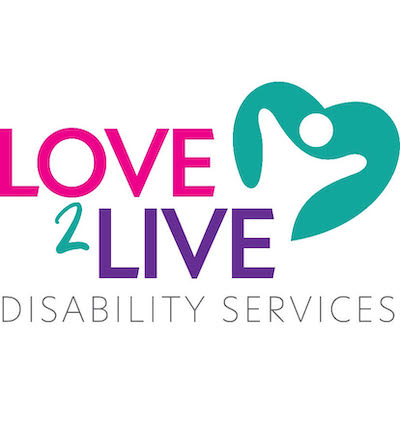FAQs
There’s been a huge amount of change in recent years, and things will of course continue to evolve. Below are some of the questions people often come to us with but, if yours isn’t answered, please do reach out and ask the team.
Is Love2Live Disability Services registered for the NDIS?
Yes – Love2Live is a registered NDIS service provider. Our experienced, caring staff team is dedicated to helping you enhance your independence and achieve your goals. Talk to us to find out how!
What services do Love2Live deliver?
We provide disability support services both in the home and in the community. Whether you have an intellectual, physical, sensory or neurological disability, acquired brain injury or degenerative disease, we can deliver supports your way.
- Innovative Community Participation,
- Support Coordination,
- Supported Independent Living,
- Daily Personal Activities,
- Development of daily living and life skills,
- Household tasks,
- Assistance with travel/transport arrangements,
- Participation in community/social and civic activities,
- Accommodation / Tenancy Assistance.
How much do Love2Live’s services cost?
The NDIS sets service rates – our rates sit within their limits. Most importantly, we want to work with our customers to make sure you get the most from your NDIS Plan.
Can I choose my own staff?
We will always try to work within your staffing preferences – we know how important it can be to find someone you feel comfortable with. If you have support staff employed by another agency that you’d like to keep, we are happy to discuss the possibility of them joining our team.
Do all your staff have police checks?
Yes. All staff have police checks.
Can I receive supports at the weekend, at night or on holidays?
Absolutely. We can arrange support whenever you need it – including holiday periods, at home and away. Just let us know what you’d like to, or are planning to do, and we’ll do our best to accommodate.
How do I find a service provider?
If you’ve been allocated funds for supports you’ve never had before, or are ready to find a new provider, you can begin the search by:
- Asking your Local Area Coordinator for a list of registered providers in your area
- Seeking help from you support coordinator – if their services are included in your plan
- Checking out the Provider Finder – https://www.ndis.gov.au/participants/working-providers/find-registered-provider/provider-finder
- Asking around – personal recommendations can be absolutely invaluable, especially from people who have a true understanding of you needs and goals.
What makes a good Disability Support Provider?
Firstly, as human beings we’re all different – which means what works for one person won’t necessarily work for another. Take your time, ask lots of questions, and know that if it doesn’t work out you are always free to change. The great joy of the NDIS!
Check out your options: Look at the range of providers in your area, and see what they offer. Specify your needs and wants and see if they might be a match.
Get the lowdown on their reputation: Communicate with friends, family and trusted peers to hear first-hand what their services are like. Find out a bit about their background, their staff and check they’re a registered NDIS provider.
Evaluate their process: Ask lots of questions and sure you’re happy with how thorough and methodical they are in communicating their offering and their processes. You need to know you’re in knowledgeable hands.
What is a service agreement?
Your service agreement is the legal document that sets out the agreement between you and your service providers. It will include detail on which supports will be provided, how much they cost and how they will be paid for, how long the supports will be provided. It covers both your obligations and the responsibilities of the service provider.
How can I change my disability service provider?
Whether your needs are evolving, you’ve moved to a new area, or your current provider just isn’t hitting the mark, it’s important to know that you’re 100% in charge. Finding someone who understands your unique needs and is committed to helping you reach your goals is what it’s all about – even if it doesn’t happen immediately.
In terms of the practicalities, you’ll need to think about:
- Cancelling existing service bookings
- What you want to do the same/differently next time
- What your needs are moving forward.
To put the wheels in motion with your current provider, you’ll first need to read your service agreement to understand:
-
- your obligations around a notice period
- and whether they need to be notified in writing (tip – it can be useful to request an acknowledgment that they have received).
You may also want to request any documentation that might be useful to share with your next provider.
Then you can just cancel the service bookings in the NDIS portal or, if your NDIS plan is managed by the NDIA (agency managed), your current provider must end their service booking in the MyPlace portal.
Done!
What questions should I ask potential providers?
Of course, you’ll have questions specific to you – particularly where there are complex needs or circumstances – but the suggestions below will give you at least a starting point.
- What areas do they serve? It sounds obvious, but there will be geographic boundaries, so worth establishing up-front.
- What services do they provide? Not just what you’re currently looking for, but options you might not even have thought of.
- How personalised can their supports be? It’s good to understand how prescriptive they are, or how tailored to your individual needs.
- What are their values as an organisation? Don’t assume you’ll get corporate jargon – this can be a good opportunity to understand the people you’re dealing with and the reasons why they do what they do.
- Find out who you can speak to when you have questions or concerns. You need to feel that your voice will be heard.
- Discuss how their supports fit into your NDIS plan budget, and get a sense of how much their services cost. Check out the NDIA’s pricing guide so you’ll know what you can expect – https://www.ndis.gov.au/providers/pricing-arrangements
- What say do you get in who works with you? For many people, having control over who your assigned support worker/s are is hugely important. Understandably! Ask the question.

